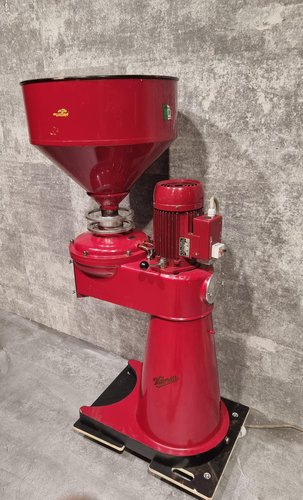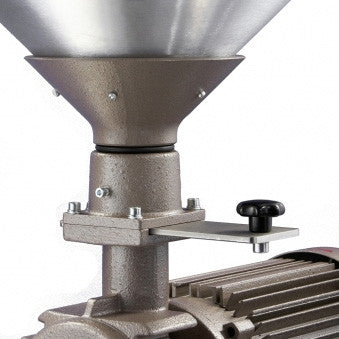Industrial Coffee Mill Guide: Boost Performance and Quality
In the affordable landscape of coffee manufacturing, selecting the appropriate commercial coffee mill plays a pivotal function in boosting both effectiveness and item top quality. Comprehending the subtleties of numerous grinder kinds and vital features-- such as customizable work settings and durable building-- can dramatically influence the final taste account of the coffee.
Comprehending Mill Kinds
When selecting an industrial coffee grinder, comprehending the numerous types offered is essential for optimizing both flavor removal and operational effectiveness. Both main sorts of grinders are blade grinders and burr grinders. Blade grinders make use of sharp blades that chop coffee beans right into inconsistent dimensions, bring about uneven extraction and possibly unwanted tastes. While blade mills are typically extra appropriate and cost effective for small-scale operations, they are generally not advised for industrial usage.

Inevitably, choosing the ideal type of mill is essential to maintaining quality and effectiveness in coffee manufacturing, making it imperative for organizations to spend in high-quality burr mills for optimal results.
Key Attributes to Consider
Picking a commercial coffee grinder calls for careful consideration of several key functions that can dramatically influence both efficiency and the total coffee experience. Among the key aspects to evaluate is the grinding mechanism. Burr mills are typically chosen over blade grinders, as they supply a regular work dimension, which is critical for optimal extraction and taste.
One more essential attribute is the mill's ability. Depending upon the volume of coffee you require to process, select a design that can handle your demands without compromising rate or high quality. Furthermore, take into consideration the work settings supplied. A functional mill with numerous setups permits you to tailor the work size to different brewing techniques, enhancing the coffee's taste account.
The construction product likewise plays a duty in resilience and upkeep. Stainless-steel parts often use long life and are much easier to clean up, which is necessary for maintaining hygiene criteria. Finally, assess the grinder's sound level, specifically in a busy café or manufacturing atmosphere, where excessive sound can be disruptive. Purchasing a mill that stabilizes these features can greatly enhance both operational effectiveness and the high quality of the coffee served.
Optimizing Grinding Refine
To attain the finest outcomes in coffee preparation, maximizing the grinding procedure is vital. The work size significantly affects extraction, flavor, and general high quality of the brewed coffee.


Additionally, monitoring the grinding rate can enhance the procedure. Slower grinding typically produces less warmth, protecting fragile tastes and fragrances. On the other hand, quicker grinding may create extreme warm, negatively affecting the coffee's top quality.
Maintenance and Care Tips
Correct maintenance and treatment of industrial coffee mills are necessary for ensuring optimum performance and durability. Regular cleansing is the structure of upkeep; residue accumulation can affect flavor and grinding effectiveness. It is a good idea to cleanse the grinder after each use, cleaning down the exterior and getting rid of any kind of coffee grounds from the burrs.
Additionally, check the grinding burrs for damage. Boring burrs can endanger grind uniformity, so they ought to be changed as needed. Industrial Coffee Grinder. Regularly calibrating see the mill is additionally critical, as this keeps the desired grind dimension for various developing approaches
Lubrication of moving parts should be executed according to the producer's specifications, as this minimizes friction and extends the life of the tools. It is vital to use food-grade lubes to make certain safety and compliance with wellness guidelines.
Lastly, maintain the mill in a stable and completely dry atmosphere to stop corrosion and corrosion. By adhering to these upkeep and treatment suggestions, operators can boost the efficiency of their industrial coffee mills while making certain premium outcome and extended functional life.
Roi Evaluation
Evaluating the return on investment (ROI) for industrial coffee mills is vital for organizations looking for to optimize their coffee manufacturing capabilities. A complete ROI evaluation aids identify the monetary stability of purchasing top quality grinders, allowing services to weigh the first prices versus potential gains.
To carry out a thorough ROI evaluation, services must consider several key variables. Initially, examine the purchase rate of the mill, consisting of installation and any kind of required alterations to existing facilities. Next off, calculate functional costs, consisting of power consumption, upkeep expenditures, and labor efficiency enhancements. High-performance mills frequently cause lowered grinding time and raised throughput, which can substantially enhance efficiency.
Additionally, take into consideration the effect on item high quality. Industrial Coffee Grinder. Superior grinders produce an even more regular grind dimension, which can enhance taste profiles and consumer complete satisfaction, ultimately driving sales. By boosting the high quality of the final item, companies can warrant higher prices, leading to raised profits
Conclusion
In recap, a commercial coffee mill plays a crucial duty in improving both effectiveness and item top quality within coffee manufacturing. By picking high-quality burr grinders outfitted with crucial features such as adjustable grind setups and durable construction, companies can make sure optimal taste extraction. Normal maintenance is essential for maintaining mill performance and taking full advantage of consumer satisfaction. Ultimately, the strategic investment in a reputable grinder adds significantly to enhanced profits and competitiveness in the coffee market.
In the competitive landscape of coffee manufacturing, picking the right industrial coffee grinder plays an essential role in improving both efficiency and item high quality. The 2 main types of grinders are blade grinders and burr mills. Within the burr mill category, there visit homepage are flat burr mills and conical burr mills, each with its advantages. Burr mills are generally preferred over blade mills, as they offer a regular work dimension, which is essential for optimal removal and flavor.
In recap, an industrial coffee grinder plays an essential duty in enhancing both efficiency and product top quality his explanation within coffee manufacturing.